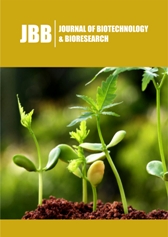- Submissions

Full Text
Journal of Biotechnology & Bioresearch
Ethical Restructuring: The Fairness Debate Triggered by Bio Enhancement Technologies
Zhang Jie1 and Tang Jinwu2*
1Civil Aviation University of China
2Jiangsu Ocean University, China
*Corresponding author:Tang Jinwu, Jiangsu Ocean University, China
Submission: June 27, 2024;Published: July 02, 2024

Volume5 Issue3July 02, 2024
Opinion
In the flood of technology in the 21st century, the rapid development of bio-enhancement technology is reshaping the boundaries of human potential in an unprecedented way, especially in the field of competitive sports, which is triggering a profound and complex ethical debate. With the progress of gene editing, nanotechnology and other means, human beings no longer only rely on the talent and acquired training given by nature, but can directly intervene in their physiological function with the power of science and technology to achieve unprecedented physical improvement. However, this leap in ability also poses an unprecedented challenge to the cornerstone of sports, the principle of fair competition.
First, the blurred boundary between nature and man-made. For a long time, sports competition has been regarded as a stage to show human natural ability and spiritual outlook. Its charm largely stems from the fair competition between participants based on talent, effort and strategy. However, the involvement of bioaugmentation techniques, especially gene editing techniques such as CRISPR / Cas 9, makes it possible to artificially alter genetic information in athletes, such as enhancing muscle strength, improving endurance, or improving response speed. Nanotechnology can transform the human body at the micro level, improve the efficiency of blood circulation, and accelerate the recovery ability. These technologies blur the line between natural competence and human intervention, raising deep questions about what is a real expression.
Second, the threat of equal competition. The unequal access to bio-enhancement technology has become one of the greatest threats to sports equity. In the real world, these expensive and advanced technologies are often the first adopted by rich countries and elite athletes, which will undoubtedly exacerbate the existing resource inequality and lead to the emergence of a “genetic gap”. For athletes who cannot afford the high cost, they will face an unfair playing field whose natural talents can be easily surpassed by technologically enhanced rivals. This difference not only destroys the fairness of the games, but also may further widen the gap between social classes and harm the universal value of sports.
Third, rule reconstruction and ethical challenge. In the face of the impact of bio enhancement technology, international sports organizations and national governments are faced with the urgent task of making new rules to ensure the fairness of sports events and the rights and interests of participants. On the one hand, the need to establish clear standards for technology use, which types of biological enhancement technologies are allowed, which are prohibited, and how to conduct effective testing are all urgent problems to be solved. On the other hand, it needs to consider how to avoid technology abuse while protecting the health of athletes and ensuring that technological progress benefits all athletes rather than becoming the privilege of the minority.
Fourth, the construction of the ethical framework. It is urgent to construct a comprehensive framework of sports ethics. This includes an ethical assessment of bioaugmentation techniques, ensuring that the application of technology does not harm the physical health of athletes, does not lead to irreversible genetic consequences, and does not undermine the spiritual connotation of sport. In addition, transparency and openness should be emphasized, and the use of bio enhanced technology by athletes should be open and transparent and subject to public supervision. At the same time, the education of athletes should be strengthened to fully understand the pros and cons of bioaugmentation techniques, as well as their impact on individual identity and sportsmanship.
The reshaping and challenge of sports ethics by biological enhancement technology is essentially a collision between scientific and technological progress and human values. While exploring the potential of new technologies, we must adhere to the core principle of fair competition and ensure the purity and inclusiveness of sports competition. Through international cooperation, establishing a scientific and reasonable regulatory mechanism, promoting the fair distribution of technology, and guiding the healthy development of bio enhancement technology in the field of sports on the basis of ethical, legal and social consensus, can we truly usher in a future arena full of innovation and fairness.
© 2024 Tang Jinwu. This is an open access article distributed under the terms of the Creative Commons Attribution License , which permits unrestricted use, distribution, and build upon your work non-commercially.
 a Creative Commons Attribution 4.0 International License. Based on a work at www.crimsonpublishers.com.
Best viewed in
a Creative Commons Attribution 4.0 International License. Based on a work at www.crimsonpublishers.com.
Best viewed in 







.jpg)






























 Editorial Board Registrations
Editorial Board Registrations Submit your Article
Submit your Article Refer a Friend
Refer a Friend Advertise With Us
Advertise With Us
.jpg)






.jpg)














.bmp)
.jpg)
.png)
.jpg)










.jpg)






.png)

.png)



.png)






